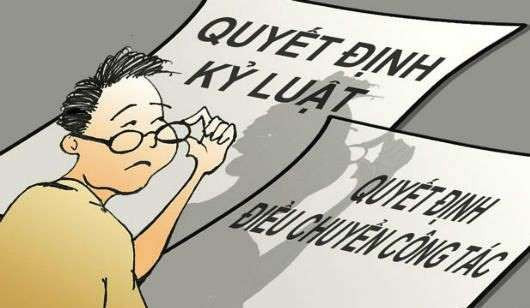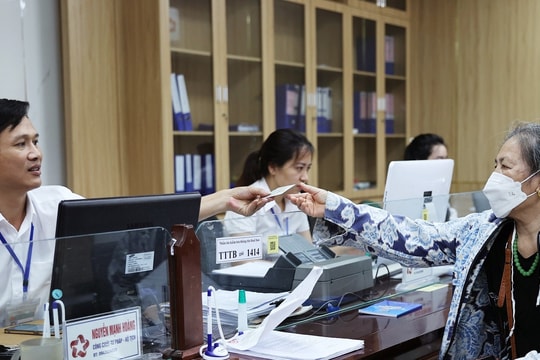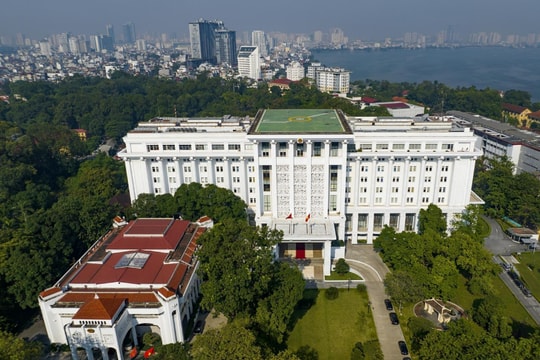The Ministry of Home Affairs proposed to supplement regulations on disciplinary action against retired officials.
Draft Decree of the Ministry of Home Affairs supplements principles for handling administrative discipline against retired people who commit violations during their working time.
Based on the provisions of the Law amending and supplementing a number of articles of the Law on Cadres, Civil Servants and the Law on Public Employees (Law No. 52/2019/QH14) passed by the 14th National Assembly at the 8th Session, the Ministry of Home Affairs has drafted a Submission and draft Decree of the Government regulating disciplinary action against cadres, civil servants and public employees.
|
| Illustration photo. |
However, there were still different opinions during the process of drafting the Decree. Specifically, the Law on Cadres and Civil Servants 2008 stipulates that there are 4 forms of discipline for cadres: reprimand, warning, dismissal, and removal from office.
However, currently, in legal documents on organizational apparatus (such as the Law on Organization of the National Assembly, the Law on Organization of Local Government), there are only regulations on dismissal but no regulations on violations, procedures and disciplinary actions for cases of reprimand, warning, and dismissal, especially for commune-level cadres.
This creates a legal gap, causing difficulties in handling disciplinary actions against officials, failing to ensure the principle of strictly handling violations, and the principle that Party disciplinary actions do not replace administrative disciplinary actions.
Regarding this issue, the Ministry of Home Affairs agreed to add regulations on handling officials in the Decree to resolve difficulties arising from practical implementation; at the same time, it also aims to properly implement the direction of the Government and the Prime Minister.
Supplementing regulations on disciplinary action against retired officials
Regarding the method of regulation, there are currently two different opinions. The first opinion suggests only regulating the application of the provisions of this Decree to handle disciplinary actions against a number of cases where officials have committed violations that are not yet regulated by law and regulations, without adding regulations on violations, forms of disciplinary action, and procedures for handling disciplinary actions specifically for officials.
Currently, the regulations only affect full-time cadres, holding positions and elected titles in state agencies (National Assembly, People's Councils at all levels). There are no difficulties or problems for cadres working in agencies of the Party, the Fatherland Front and socio-political organizations.
Therefore, if we add separate regulations for officials working in elected bodies, the discipline for the staff will be divided into two separate mechanisms. The law on the organization of the administrative apparatus also has separate regulations for the form of dismissal for elected positions, if it is stipulated in this Decree, it will be difficult to ensure consistency.
In addition, the holders of elected positions who work full-time are all party members, so normally the party discipline regulations will be implemented first, followed by the government. At that time, there will be a form of party discipline, a conclusion from the competent authority, and the administrative discipline needs to be simple in terms of order and procedure.
The second type of opinion suggests specifying the contents of disciplinary action (including violations, order, applicable procedures, and applicable authority) for all officials who commit violations, including officials working in the party, mass organization, and government systems to ensure consistency.
The draft Decree was developed by the Ministry of Home Affairs and submitted to the Government according to option 1.
The draft Decree has added provisions on disciplinary action against retired or retired officials, civil servants and public employees who have committed violations during their working time. At the same time, it has added the principle of administrative disciplinary action against violations during the working time of retired or retired people, which is implemented after a decision on disciplinary action against the Party is made.
The Ministry of Home Affairs finds that the draft regulations ensure feasibility, are consistent with practice, and ensure proper implementation of assigned regulations. In reality, most of the leadership positions in the party system, unions, and governments at all levels are currently party members. Most of the serious violations are those who have held leadership positions. Therefore, limiting administrative discipline after party discipline for this subject is necessary, ensuring deterrence and being consistent with Party regulations. Moreover, the draft regulations will avoid complications in terms of procedures, processes, and authority because the conclusion about the violations has been made, the form of disciplinary action has been clearly determined, and therefore, it is not necessary to implement regulations on establishing a disciplinary council, convening meetings, etc., which are very difficult to implement.
In addition, there are opinions that the regulation on administrative disciplinary action against cadres, civil servants and public employees who have retired or resigned and committed violations during their working period after Party disciplinary action is a limitation on the subjects of disciplinary action compared to the Law. Accordingly, those who are cadres, civil servants and public employees but are not Party members and have retired or resigned and committed violations during their working period will not be subject to administrative disciplinary action./.









